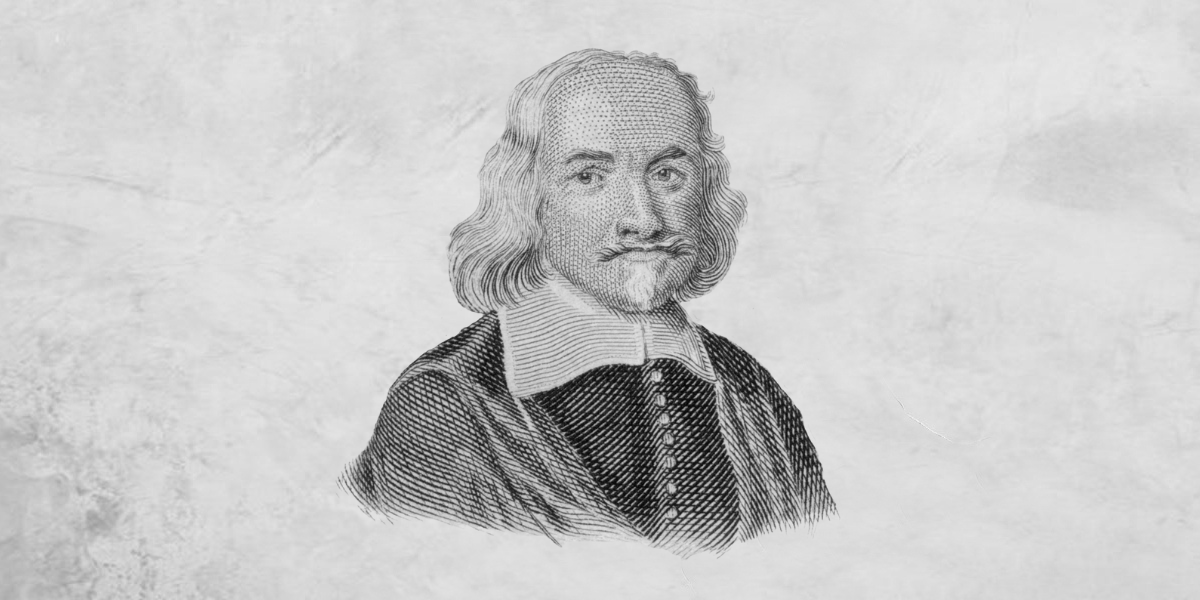
Thomas Hobbes (1588-1679) was an English philosopher, best known for his explanation of the role of government as an insurer of security, which has had an enduring influence on understandings of political philosophy.
Living through the displacement of the English Civil War (1642-1651), Hobbes was grappling with the question of how societies could keep peace and ensure stability, amid conflict and self-interest. The period was marked by social upheaval with the collapse of royal authority, clashes between the government and monarchy and insecurity, which led to him thinking about the manifestations of power, the human condition and the role of government.
His approach to understanding human behaviour was methodical and scientific, being deeply influenced by the scientific revolution of the time. Hobbes believed that human societies, like physical systems, could be understood through cause and effect and that understandings of order and stability were derived from the predictability of human behaviour and power structures.
The state of nature
It was from this historical and intellectual backdrop that Hobbes produced his most famous work, Leviathan (1651). His masterwork Leviathan: The Matter, Forme and Power of a Commonwealth Ecclesiasticall and Civil, garnered him fame for creating what would later become known as the Social Contract Theory, a framework that explains and justifies the exchange that free, equal and rational citizens make in surrendering certain freedoms in return for collective order and protection. This same contract also serves to provide legitimacy to governments and their use of power and authority over citizens.
In Leviathan and his other work, Hobbes disagrees with Aristotle that humans are naturally suited to life as citizens within a state. Hobbes instead argues that humans are not equipped to be rational citizens, as we are easily swayed, often short sighted and highly competitive. He believes these characteristics make humans more predisposed to violence and war rather than political order, with no natural self-restraint. Hobbes states that in this state of nature, without government and order, the life of man is “poor, nasty, brutish and short”, largely due to the insecurity and conflict. Everyone is free and equal, without any rules or restrictions to their actions and coupled with a self interested nature and limited resources, life in this state is a constant struggle.
The social contract
To escape this constant struggle in this state of nature, Hobbes argues that people, through reason, collectively agree to create a social contract. Hobbes believes that political order is only formed when human beings voluntarily give up some of their rights and freedoms, in exchange for order and security from a common authority, the leviathan (a ruler).
Hobbes uses the Leviathan as a metaphor for a powerful ruler or government that embodies the collective will of the people, possessing absolute authority to maintain peace and prevent society from descending back into chaos. Hobbes conception of a social contract and the role of the sovereign or leviathan, refers to these key characteristics:
- The sovereign or leviathan’s power must be absolute – only one authority, as divided power invites factionalism.
- The contract is driven by the purpose of security.
- Individuals cannot revoke the contract once it’s been made, as it would risk bringing back chaos.
- The contract is between the people and the sovereign is not party to this agreement. However, if the sovereign fails to maintain peace and security, the contract loses legitimacy and people return to the state of nature.
This framework for the social contract theory by Hobbes, was adopted by John Locke and Jean-Jaques Rousseau. However, they differed from Hobbes by offering a more optimistic view of human behaviour and the role of government. Critical responses tended to focus on a lack of accountability measures on the leviathan who has expansive absolute power. Locke for example took a liberal view, involving limited government and argued the leviathan was mutually obligated within a social contract, rather than subjects being expected to obey unconditionally to avoid the collapse of civil society.
Hobbes’s ideas continue to shape how government and authority is understood. While very few modern states reflect the vision of an absolute sovereign, the core principles of the social contract theory remain central to political thought. The consent of citizens to be governed in exchange for protection and the rule of law persists. However, in modern liberal democracies, the power of governments is placed under greater scrutiny through constitutions, elections and other checks and balances. Hobbes’s theory provides the foundation for understanding why societies form governments, even as modern democracies reinterpret his ideas to prioritise liberty, representation, and accountability alongside security and order.

BY The Ethics Centre
The Ethics Centre is a not-for-profit organisation developing innovative programs, services and experiences, designed to bring ethics to the centre of professional and personal life.
Ethics in your inbox.
Get the latest inspiration, intelligence, events & more.
By signing up you agree to our privacy policy
You might be interested in…
Opinion + Analysis
Politics + Human Rights, Relationships
Do Australia’s adoption policies act in the best interests of children?
Opinion + Analysis
Politics + Human Rights, Relationships
Calling out for justice
Opinion + Analysis
Politics + Human Rights
Do states have a right to pre-emptive self-defence?
Opinion + Analysis
Politics + Human Rights, Relationships




